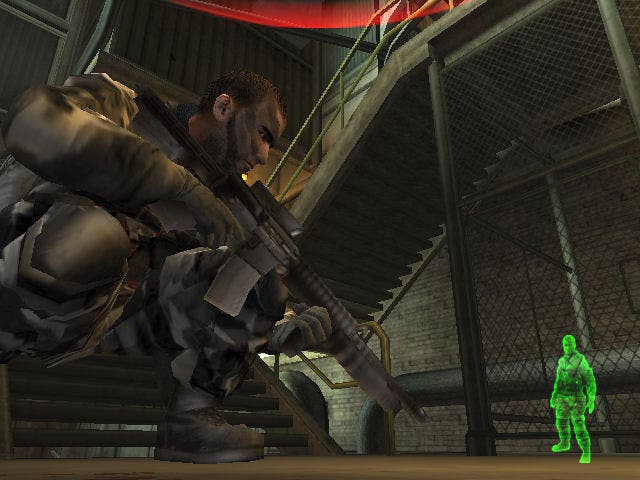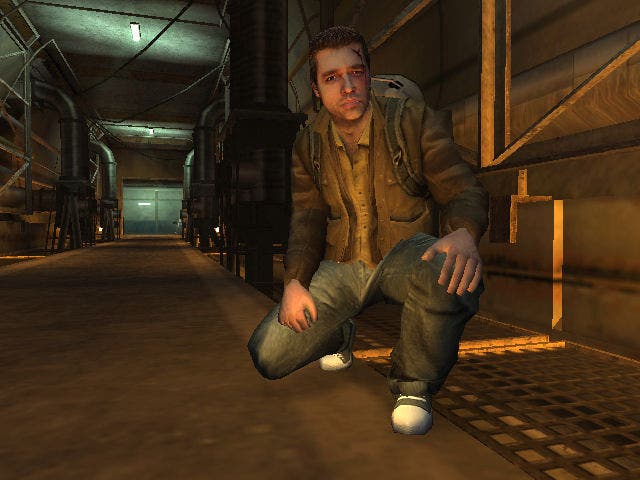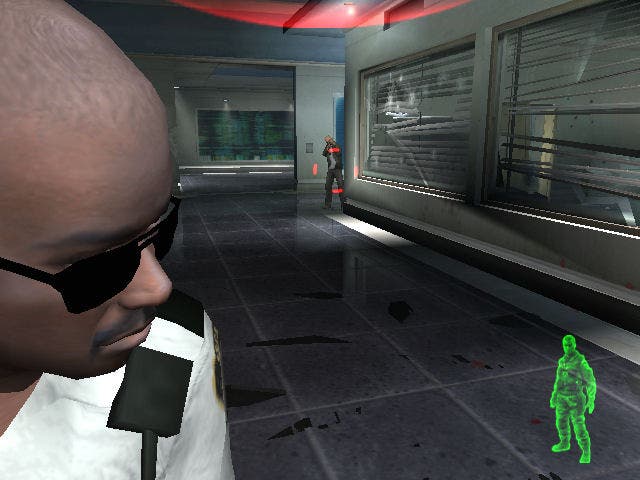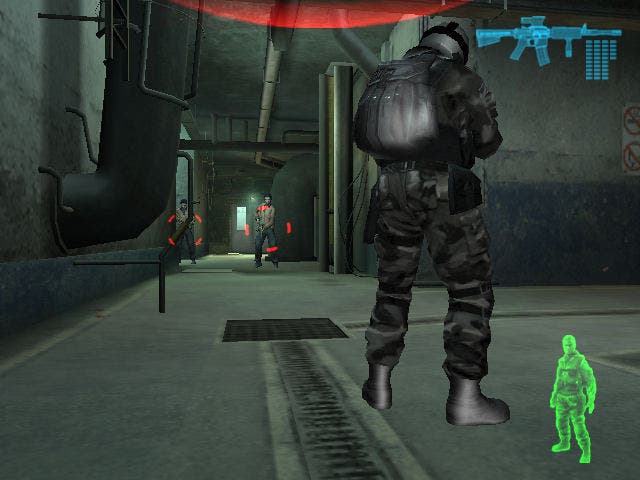It Came Without Warning
An exclusive interview with Circle Studio's Adrian Smith about life after Lara, the break up of Core and the formation of the studio behind Capcom's Without Warning.
The fact that Tomb Raider: Angel Of Darkness was such a disappointment was enough of a shock for long-term followers of Lara Croft. The fact that the brand was taken away from Core Design, the company responsible for it, was an even bigger one that ripped the heart out of the company almost immediately, with the bulk of the once-proud company upping sticks and starting all over again a mere quarter of a mile across Derby's Pride Park.
With money in the bank, it would have been relatively easy for Jeremy Heath-Smith and brother Adrian Smith to have licked their wounds, bought an island in the sun and lived out their days sipping cocktails and living the high life. But to their credit they took the hurt and public humiliation squarely on the chin, formed Circle Studio, re-hired the best talent they could and set about learning the lessons of the past and looking to a positive future.
And here we are: 18 months down the line Circle is well and truly back, having sufficiently impressed Capcom to tempt the Japanese publisher into signing its first ever European-developed game, Without Warning.
We took a trip up the M1 to see the game in action for the first time, and talk to development director Adrian Smith to find out the full fascinating account of how Core imploded, life after Lara Croft, and how Without Warning was born.

No, not really. I think the end of Core was reasonably well documented from one perspective - certainly not ours, I think more the Eidos side, and there's still a lot we're bound and gagged not to talk about. But it wasn't great at the end and I think fundamentally we made mistakes, and we were probably big enough to put our hands up and accept those mistakes.
Ultimately Jeremy [Heath-Smith] had no choice because he was officially put on gardening leave, and I think at the same time we'd probably lost a lot of what this industry was about and I'm not so sure it is about now, but we'd certainly lost a lot of the fun side, a lot of creativity we felt was being sucked away.
Tomb Raider was a fantastic thing to be involved with and a fantastic thing to have ownership of, and it's also a massive weight around your neck, like you had to do a game every nine months for the best part of five years and that was really hard work to be honest. We wanted time to do different things, and the level of importance to Eidos of Tomb Raider as we all know was massive.
In a way, yes. We'd had a good run at it. I think we needed a change in direction and we needed to do things differently. So I think, yeah, take it away and give it to someone with a new perspective; let's see what they bring. I'd like to think it was something new and fresh and innovative, [but] I'm not so sure.

It was still a shock, purely because I think that we did what we had to do for five or six years; we had to get a game out for that period of time and we got a game out, and just to be told 'Oh, great, thanks', it felt very much like it didn't account for a great deal. I think that's probably the thing that hurt more than anything.
Yeah, if I'm honest I think it was probably the best thing that could have happened because it gave us the opportunity to leave, to take the people that we wanted, to start afresh, to move a quarter of a mile away. We took 35 people, and now we're up to 52 people. Actually, I asked 35 to come and 33 came.
There were about 70 originally, and they got rid of the test department which was about 12 people, so there were probably about 30 left. It was sad. I stopped off for about six weeks after it was fairly public just to make sure that royalties came in for Tomb Raider and things like that. I was probably the hardest six weeks I've ever done. It was not nice, because it was a company that we built, I guess. It was a building we built and one day I just walked out, shut the door, got in my car and drove out. It was bizarre.
No, there was no emotion - that was the bizarre thing. But we were really positive for the future in that we got out the people we wanted, we had all the disciplines covered off, and the first three months of coming here we basically sat down and said let's just do what we've been asking to do for a long time; let's look at the industry. What's working, what's not working? Let's look at what's been successful for us in the past and what hasn't and why, and we did just literally sit for about three months pushing bits of paper around, speaking with the teams and put together a Circle Studio procedure document/bible.

In essence we tried to get 15 years of our history, good and bad, down on a piece of paper. It was quite scary because you think you know it all and then you put it down on paper and go 'f***! Actually it doesn't work! There are holes in it'. That document still exists today, it's still revisited, and 15 months on we've revisited it a couple of times and looked at the structure, and the structure has changed a little bit. Our statement to everybody was we're never going to go through what we've been through over the last 18 months because the end of Tomb Raider was a grueller, and people did go beyond the call of duty; work [long] hours and everything, and were fantastic. For the end result to be what it was was disappointing for everybody.
There were. One was in full production and another was about to be kicked off. They were just left with no management of any form. [Mentions that Core is still working on two unrelated projects with Eidos] So yeah, it's interesting. They're down the road, we've bumped into people in Sainsbury's, and we're all chirpy because we're happy...
[Laughs] Yes it is; a hotbed! So, yeah, it brought us to Circle, what happens with Tomb Raider? I dunno. What happens with Core. I don't know. We have very little to do with it. We're 52 people and that's it.
Great! Fantastic!
Errr, yeah. Yeah to be honest. Yeah I did. Galleon, I don't know... bless 'im, that must have been the single biggest labour of love ever. We always kept in contact with Toby; he was always invited to Tomb Raider events, movie events and things, and certainly between us and Toby there was no problem at all. We never said Toby had nothing to with it, we were always very open about that, and we had a good relationship with him. At the end of Galleon I guess [Eidos] made contact and he went over to Crystal.

Sometime before the demise we thought maybe being a development studio is not a bad thing, but we believed too much in the people that we'd got and what we'd built, and we just thought there was a lot that could be put right and could be put right relatively easily, and we really wanted to do it again. There was never any doubt that we wouldn't do it, literally from the first day that Jeremy walked out of the building it was a go from there on in.
Yes, basically. We've added Martin Carr - who used to be from Hothouse - as business development director. He's out there a little bit more. That's certainly an area we didn't have to do much of at Core - as in going and getting the product out and [touting it] around. There are other products semi-live in the building that Martin is out talking about with publishers about. Apart from that, Jeremy does the London thing, has the relationship with Capcom and so on.
Yeah, very much so. It is the first European product signed with them, which is probably why it took so long!
We did, yes, we did really well, and I guess there's a Tomb Raider element to that and a general interest in what we were doing, and at the end of the day I do think that what we've done is brave. I don't know if brave is the right word, but we set up 35, up to 50 people over a 12 month period; it's quite aggressive in an industry which is pretty bloody hard. I mean we all know it's hard - we're not going to say it's fantastic out there. It is hard at the moment, but we haven't really skimped, and we've made sure everybody has got what they want, and we self-funded it and said "look, we've developed something that we believe in as a company and a product and we'll take it to a point that we're happy. We're not just going to do a few months R&D and go and tout it around.
We went out to E3 [last year] and had a few meetings, but probably around about June, July time in anger. We were probably six, seven months in. We were quite a way down the line. We didn't approach it that we were going to do some high concept and go out and see what the level of interest was and then come back and design the game. We did go out with a game and say, "look, this is the game, this is what it's going to be" and it still is that today.
Check back tomorrow for the second part of our exclusive interview with Circle Studio, as Adrian Smith talks about the inspirations for Without Warning, the creative process, and why Capcom's first ever European signing will be one of the games to watch in 2005.

